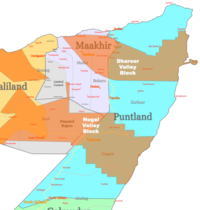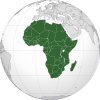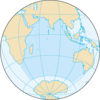Puntland
Puntland State Of Somalia أرض البنط | |
|---|---|
| Anthem: Puntland Somali National Anthem | |
 | |
| Capital | Garowe |
| Largest city | Bosaso (Commercial Capital) |
| Official languages | Somali and Arabic |
| Government | |
| Mohamud Muse Hersi | |
| Hassan Dahir Mohamud | |
| Independence From Somalia | |
• Proclaimed | 1998 |
• Recognition | Unrecognized |
| Area | |
• Total | 116,000 km2 (45,000 sq mi) |
• Water (%) | Negl. |
| Population | |
• 2003 estimate | 2,400,000[1] (140th) |
• Density | 11.3[2]/km2 (29.3/sq mi) (205th) |
| Currency | Somali shilling (SOS) |
| Time zone | UTC+3 (EAT) |
• Summer (DST) | UTC+3 (not observed) |
| Calling code | 252 (Somalia) |
| Internet TLD | .so |
Rankings may not be available because of its unrecognized de facto state. | |
Puntland is a region in northeastern Somalia, centered on Garowe (Nugaal region), whose leaders in 1998 declared it to be an autonomous state. Unlike neighbouring Somaliland, it does not seek outright independence from Somalia. The name is derived from the Land of Punt mentioned by ancient Egyptian sources, which is believed by some to have existed in what is now Somalia.
History
Puntland considers itself as an autonomous state within Somalia. In 1969, when Somalia's government was toppled in a coup d'état, years of war and chaos followed. An unsuccessful invasion of Ethiopia followed the Soviet Union's change of support from Somalia to Ethiopia, caused by the rise of a pro-Soviet government in Ethiopia. Left without Soviet support, Somalia turned to the United States, which allowed Somalia's self-proclaimed president, Siad Barre, to stay in power through the end of the Cold War in 1991. When the Soviet Union collapsed, American support for the Somali government was withdrawn, and Barre was overthrown.
Following these events, Somalis remained without a strong government, with constant wars ravaging the southern part of Somalia. These events led to the 1991 attempted secession of the Somaliland region of Somalia, which in 1960 had enjoyed a few days of independence. Violence continued throughout the country, prompting a United Nations peacekeeping force to be sent to war-torn Somalia. The relief effort ended however on March 3, 1995, almost two years after the Battle of Mogadishu when two American MH-60 Black Hawk helicopters were shot down and 18 soldiers were killed.
Somalia remained unstable and, in 1998, Puntland declared its autonomy. Although it is a tribal-based separation under the presidency of Abdullahi Yusuf Ahmed (deputy president of the Somali Salvation Democratic Front), Puntland is a region with clan confederation as one of its top priorities. Since 1998, Puntland has also been in territorial disputes with Somaliland over the Sool and Sanaag regions. Yusuf was an army major when he sought political asylum in Ethiopia. He led the first group of resistance fighters belonging to Majeerteen tribe, whose ultimate goal was to free Somalia from dictatorship.

Unlike the self-declared state of Somaliland, Puntland is not trying to obtain international recognition as a separate nation. It seeks to become a federal division within a united Somalia that is a federal republic. But the two so-called "lands" have one thing in common: they both base their support upon tribal elders and their way of organization along lines based on tribe and kinship. The Somali capital Mogadishu, and other southern cities, are said to have developed much less than cities in Puntland and Somaliland (e.g. Bosaso, Hargeisa, Las Anod, Garowe, etc.) These two self-declared independent regions obtain their economic and political support from Ethiopia, historically an adversary of Somalia.
Puntland began experiencing political unrest in 2001 when President Ahmed wanted his term to be lengthened. Ahmed and Jama Ali Jama fought for control of the country, which Ahmed won in 2002. Ahmed served as president until October 2004 when he was elected President of Somalia. He was succeeded by Muhammad Abdi Hashi who served until January 2005 when he was defeated for re-election by Parliament, which elected General Mohamud Muse Hersi ("Adde"). In December 2004, Puntland sustained serious damage during the tsunami following the 2004 Indian Ocean Earthquake. The international community has been accused of ignoring Puntland and other African areas where the tsunami struck.
In November 2006, the Union of Islamic Courts reportedly captured Bandiiradley, a strategically located settlement near Puntland's border with Mudug. However, a spokesman for local warlord Abdi Hassan Awale Qeybdiid claimed that his troops had only made a tactical retreat from the area. Mohamed Mohamud Jama, a Mudug-based spokesman for the Islamic Courts, announced the courts' intention to march on Gaalkacyo, part of which is claimed by Puntland. Heretofore, the courts had avoided making incursions into Puntland.[3] That same month, General Adde announced that he would rule according to Islamic law but in a different way from that of the Islamic Courts in order to avoid "politicising religion." Adde then announced that Puntland would resist any attack made by the Islamic Courts. [4]
Tensions between Puntland and Somaliland heightened to a violent clash in October, 2007.[5]
Politics
President Mohamed Musa Hersi dismissed the parliament of Puntland on December 9th 2007, and effectively rules by decree.[6] This follows a year of defections and secessions from Puntland over the increasingly autocratic governing style of the president sparked initially by a demand earlier in 2007 for an audit of the budget. Fallout from this political crisis include the defection of Ahmed Abdi Xabsade to Somaliland and the invasion of Sool by Somaliland and his supporters, the secession of Puntland-controlled Sanaag and subsequent creation of the state of Maakhir, and recently the defection of the commander of Puntland military forces in Sool to Somaliland.
Economy
Puntland has 1600km of coastline, which is abundant with fish and other natural marine resources. However, after the collapse of the Somali central government in 1991, the coast was left unguarded against foreign intruders. As a result, many ships equipped with heavy trawls and other unlawful fishing equipment have worked in Puntland's territorial waters. These ships violate catch regulations, including some which keep their catch alive and stock them in waters where fishing has been depleted. Puntland's coastal authorities continue to receive complaints from local fishermen about the damage being done by these outsiders.
Puntland exports great quantities of fish types such as lobsters, dried fish, shark vines, and tuna. Sea salt is also produced.
Other economic products and activities of Puntland include livestock, frankincense, gum arabic, manufacturing and agriculture.[1]
In Lasqorey district there is a medium size fish processing plant that produces and processes great quantities of tuna fish. The products of Lasqorey fish factory reach commercial level, and its tuna are found throughout Puntland and also outside the region. A fish processing plant is also being constructed in Habo, which locals hope will reduce poverty and unemployment and improve the economy of the area.
Geography

Puntland occupies the following Regions of Somalia:
Puntland has divided Bari into two regions, Bari in the north and Karkaar in the south.[7]
- Mudug
- Gaalkacyo (Regional Capital)
- Galdogob
- Jiriiban
- Bacaadweyn
- Tuulo Buuryaqab
- Bursaalax
The following regions are claimed by Puntland, but have been under Somaliland's administration since October 2007.
Puntland no longer administers eastern Sanaag since Maakhir declared its own autonomy, however Puntland and Somaliland both lay claim to Maakhir. Puntland claims to still control the territory, and lists these administrative districts of Sanaag:
"Ayn" is the name given by the Puntland government to the area they claim in southeastern Togdheer region, which is also claimed by Somaliland.[7]
Both regions of Sool and Sanaag are in dispute, as these territories were claimed as part of the de facto self-declared state of Somaliland which formed in 1991, as being historically part of British Somaliland. Beginning in 2003, the forces of Puntland entered and occupied the eastern parts of Sool region based on irredentist desires, due to the large Darod clan population in the area. Fighting between the two forces led to casualties and captured prisoners, who were later exchanged. As a related contention, in 2005 Puntland tried to sell off mineral rights to foreign investors, including the disputed territories of Sool and Sanaag.[8][9]
As of October 20th 2007, Puntland controls no territory in either Sool or Sanaag.
Oil exploration

Puntland signed a deal with Consort Private Ltd for exclusive oil exploration rights in Puntland, interpreted in the original agreement as including Bari, Nugaal and Puntland' Mudug, Sool, Sanaag and Cayn regions. Consort then sold a controlling share (50.1%) to Range Resources of Perth, Western Australia to carry out the actual exploration. [10]
Canmex Minerals of Canada signed an agreement with Range Resources for Canmex to open oil production on 80% of any oil discovered by Range. In return, Canmex will foot the bill for exploration, amounting to up to ~$70 million, plus a $5 million signing bonus for Range. On August 23rd, 2006, Canmex changed its name to "Africa Oil Corp."[11]. African Oil Corp and continues to be based in Vancouver, British Columbia, Canada.[12]
Media
Radio Gaalkacyo is the state radio station formerly called Radio Free Somalia.
See also
Notes
- ^ Puntland State Of Somalia
- ^ Puntland State Of Somalia
- ^ "Islamists 'take key Somali town'". BBC News. BBC. 2006-11-12. Retrieved 2006-11-13.
- ^ Puntland 'to fight Islamic courts', Al Jazeera, 21 November 2006
- ^ Al-Jazeera: Rival Somali regions in armed clash.
- ^ Somalia: Puntland President Rules By Decree, Not Democracy (AllAfrica)
- ^ a b "Puntland State". Puntland State Government. Retrieved 2007-02-06.
- ^ "Somalia's Puntland Sold Exploration Rights In Somaliland". Somaliland Times. 2006-02-01.
{{cite news}}: Check date values in:|date=(help) - ^ "Somaliland, Puntland Exchange Detainees". Somaliland Times. 2005-12-07. Retrieved 2007-01-18.
{{cite news}}: Check date values in:|date=(help) - ^ Abdillahi Yusuf’s Transitional Government And Puntland Oil Deals (sic)
- ^ Oil and Mineral Exploration in Puntland, Somalia
- ^ CompanyMine information on African Oil Corp
External links
- Official Website: Government of Puntland
- Map of Puntland: Landmine Impact Survey, 2005 (4.3MB PDF file)
- Puntland: UN-OCHA Overview (PDF file)
News
- BBC: Islamists 'take key Somali town' (in Puntland) November 12 2006
- HRNet Information about Puntland and Somalia
- GaroweOnline.com: Breaking news, ed/ops through Web & Radio broadcast!
- Allpuntland.com: News, information, entertainment and more
- BBC: "Somali warlords battle for Puntland" May 7 2002
- Puntlandpost.com: News
- Wardheernews.com: News and commentary
- Wayaha.com: News
- Laasqoray.net: News
- Dhahar.com: News
- Somalia Online: News and discussions
- Somalia INFO: Full of INFO
- Hafun.Org: News Agency



